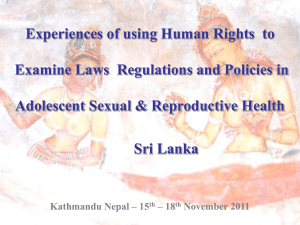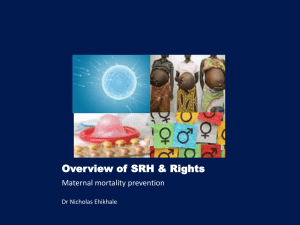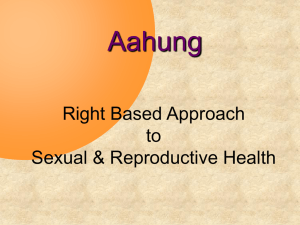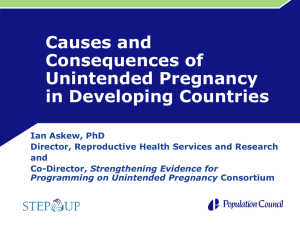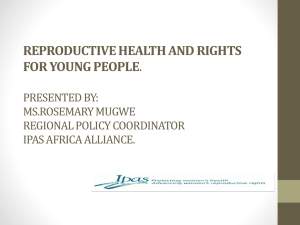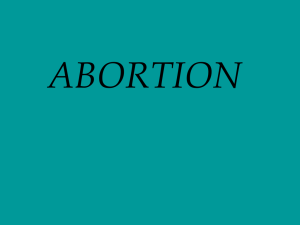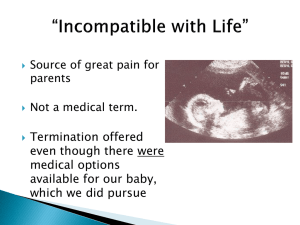Unwanted pregnancy, unsafe abortion and women`s
advertisement
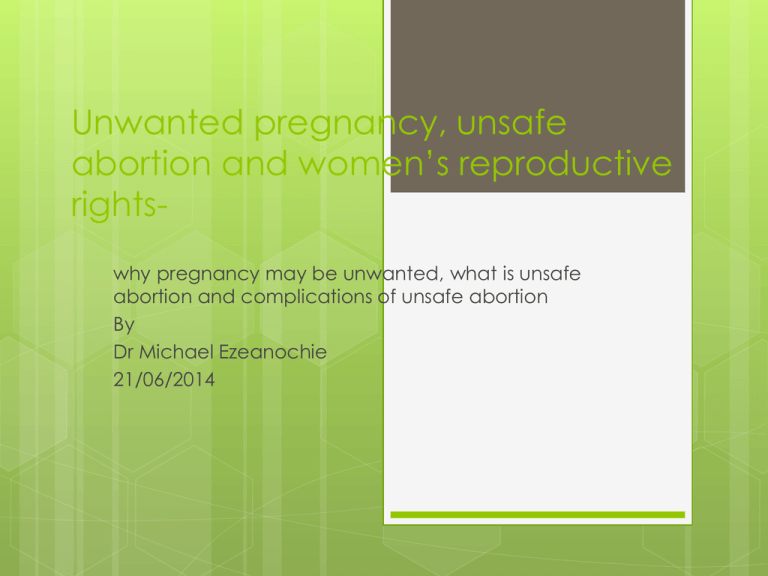
Unwanted pregnancy, unsafe abortion and women’s reproductive rightswhy pregnancy may be unwanted, what is unsafe abortion and complications of unsafe abortion By Dr Michael Ezeanochie 21/06/2014 Learning Objectives Concept of women’s Reproductive rights Unwanted/unplanned pregnancy Consequences of unwanted pregnancy Unsafe abortion Complications of unsafe abortion Introduction Sexual and reproductive health and rights or SRHR is the concept of human rights applied to sexuality and reproduction. It is a combination of four fields that are separate but inherently intertwined. These four fields are sexual health, sexual rights, reproductive health and reproductive rights. Intro Reproductive rights are legal rights and freedoms relating to reproduction and reproductive health Reproductive rights rest on the recognition of the basic right of all couples and individuals to decide freely and responsibly the number, spacing and timing of their children and to have the information and means to do so, and the right to attain the highest standard of sexual and reproductive health. They also include the right of all to make decisions concerning reproduction free of discrimination, coercion and violence Reproductive rights may include : the right to legal or safe abortion; the right to birth control; freedom from coerced sterilization, abortion, and contraception; the right to access good-quality reproductive healthcare; the right to education and access in order to make free and informed reproductive choices. the right to receive education about sexually transmitted infections and other aspects of sexuality, and protection from gender-based practices such as female genital mutilation Unwanted pregnancies Unintended pregnancies are pregnancies that are mistimed, unplanned or unwanted at the time of conception. It is a core concept to better understand the fertility of populations and the unmet need for contraception and family planning. Unintended pregnancy is associated with an increased risk of problems for the mother and foetus. Epidemiology In 2006, 49% of pregnancies were unintended Among women aged 19 years and younger, more than 4 out of 5 pregnancies were unintended. The proportion of pregnancies that were unintended was highest among teens younger than age 15 years, at 98%. Large increases in unintended pregnancy rates were found among women with lower education, low income, and cohabiting women. Source: Unintended pregnancy in the United States: incidence and disparities, Worldwide, 38% of pregnancies (about 80 million pregnancies) were unintended as at 1999. WHO ?? Nigerian figures Consequences In 2008, just over half of all unintended pregnancies (excluding those ending in miscarriage) among unmarried 20–29year-old women ended in abortion Unintended pregnancies are the main reason for induced abortions Consequences Prenatal care initiated later, and less adequate. Adversely affects health of woman and of child and less preparation for parenthood Unintended pregnancies preclude chance to resolve sexually transmitted diseases (STD) before pregnancy. Untreated STD in pregnant woman can result in premature delivery, infection in newborn or infant death. Preclude use of genetic testing to help make decisions about whether to become pregnant. Women with an unintended pregnancy are more likely to suffer depression during or after pregnancy. Poorer maternal mental health Increased risk of physical violence during pregnancy. Reduced likelihood of breastfeeding, resulting in less healthy children. Lower mother-child relationship quality and thus Greater relationship instability consequences Children whose births were unintended are: Greater likelihood of low birth weight, particularly for unwanted pregnancies Greater infant mortality. Likely to be less mentally and physically healthy during childhood. At higher risk of child abuse and neglect. Less likely to succeed in school More likely to live in poverty and need public assistance More likely to have delinquent and criminal behavior Less likely to have a close relationship with Unsafe abortion An unsafe abortion is the termination of a pregnancy by people lacking the necessary skills, or in an environment lacking minimal medical standards, or both. (WHO) Unsafe abortion is a significant cause of maternal mortality and morbidity in the world Unsafe abortions usually occur: where abortion is illegal where affordable well-trained medical practitioners are not readily available where modern contraceptives are unavailable Some common methods of unsafe abortion include: Trying to break the amniotic sac inside the womb with a sharp object or wire Pumping toxic mixtures, such as chemicals like alum and herbal preparations into the body of the woman. This method can cause the woman to go in to toxic shock and die. Inducing an abortion without medical supervision by selfadministering abortifacient over-the-counter drugs or drugs obtained illegally or by using drugs not indicated for abortion but known to result in miscarriage or uterine contraction. Drugs like oxytocin, ergometrine, misoprostol, prostaglandins , quinine, ampiclox etc. Risks include uterine rupture, irregular heartbeat, a rise in blood pressure hypertension, a drop in blood pressure cardiovascular problems, intense bronchospasms in women with asthma and death. Complications EARLY anaemia shock genital tract infection Pelvic abscess injury incomplete evacuation peritonitis renal failure Death Complications LATE Ectopic pregnancy Infertility Chronic pelvic pain Socio-economic consequences Conclusion Women's reproductive rights are intricately intertwined with their fundamental human rights They should be able to take decisions on their sexuality freely with coercion and prejudice Unwanted pregnancy often leading to unsafe abortion with its associated morbidity and mortality result from restriction of the reproductive rights of women.

